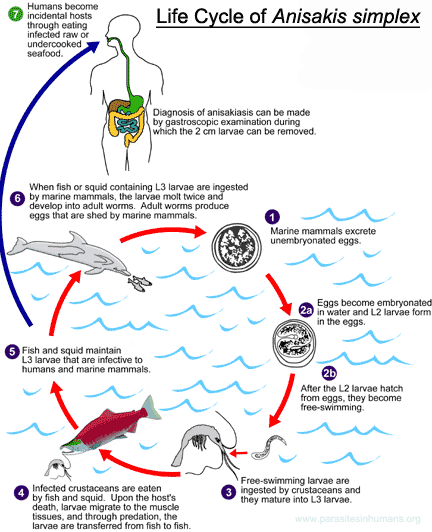Parasites In Humans
Find The Nastiest Parasites In Humans
AnisakisAnisakis worms are parasitic roundworms living in the stomach. Anisakiasis (the disease) is acquired by eating uncooked fish or squid infected with Anisakis simplex (the most common Anisakis species). The parasite has a protective layer against gastric acid and survives burrowed into the gastric wall. Larval Anisakis simplex develops into a reproducing adult only in marine mammals. In humans it cannot survive and dies within a few weeks. But the short time that it lives, it causes stomach pain and nausea. Larval Anisakis simplex is about 2 cm long. The life cycle of Anisakis begins in the feces (poo) of an infected sea mammal. The feces contain Anisakis eggs which immediately hatch in the sea water. The tiny larvae are eaten (but not killed) by small crustaceans which are eaten by fish (or squid). The larvae penetrate the gut and encyst in muscles or other parts of the fish. Finally a marine mammal eats the infected fish. The larvae excyst in the bowel and find another larvae of the opposite sex to mate with. (In humans the larvae stay in the stomach never reaching adulthood nor the small intestine.) The life cycle is completed, when a female lays eggs which exit the body in the feces. Freshly caught fish should be gutted as soon as possible. This prevents the Anisakis larvae from relocating to muscle tissue (fish flesh) from the intestine. Salting does not usually kill parasites. Freezing at -20 °C for a few days or cooking at 60 °C on the other hand will. Infected fish flesh can cause allergic reaction even if you cook it because Anisakis leaves poisons behind. Anisakiasis treatment is not always obligatory. Your doctor can diagnose anisakiasis gastroscopically. Depending on the severity of the infection, it might require medical attention. The larva(e) can be removed surgically or during endoscopic examination. A drug called albendazole might also kill it.
Anisakis QuizTo reveal the answer you need to click the correct option. Can Anisakis worms develop into adults inside humans?+ A) No
+ B) Yes
Which of the following act as an intermediate host for Anisakis species?+ A) Fish and snail
+ B) Anisakis species have no intermediate hosts
+ C) Crustaceans, fish and squid
|
Parasites In Humans Pictures And Videos Contact Info Privacy Policy Sitemap
© 2010–2015 parasitesinhumans.org




 Also check out the
Also check out the